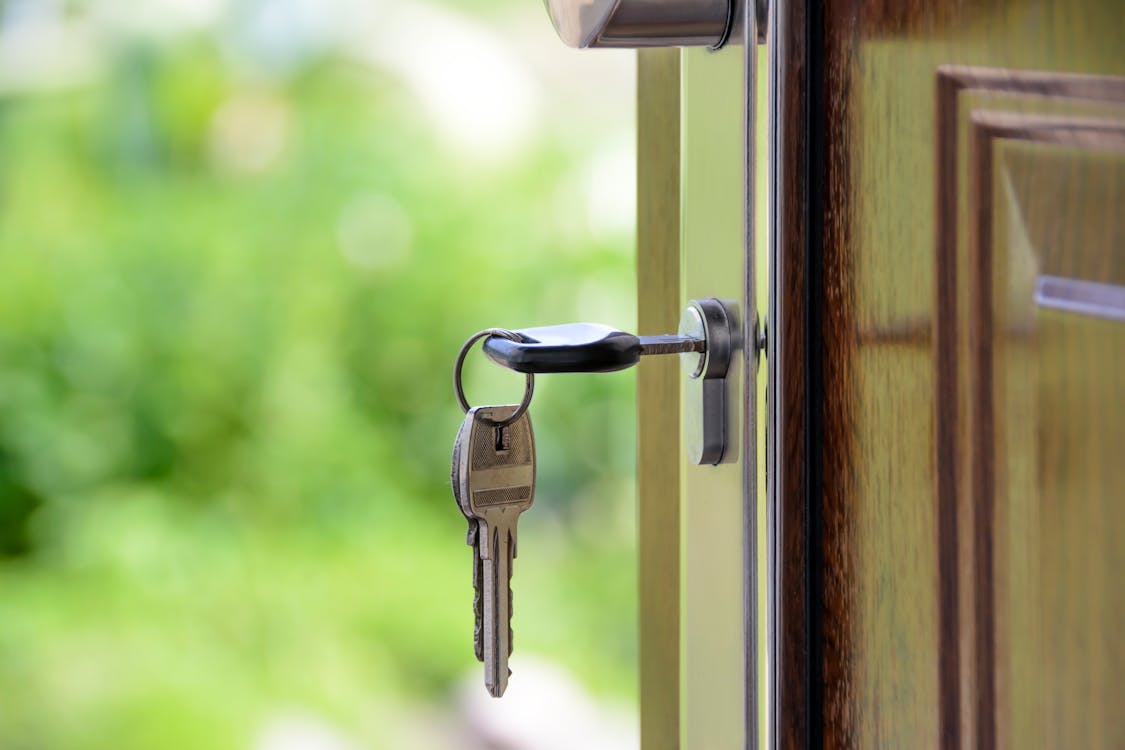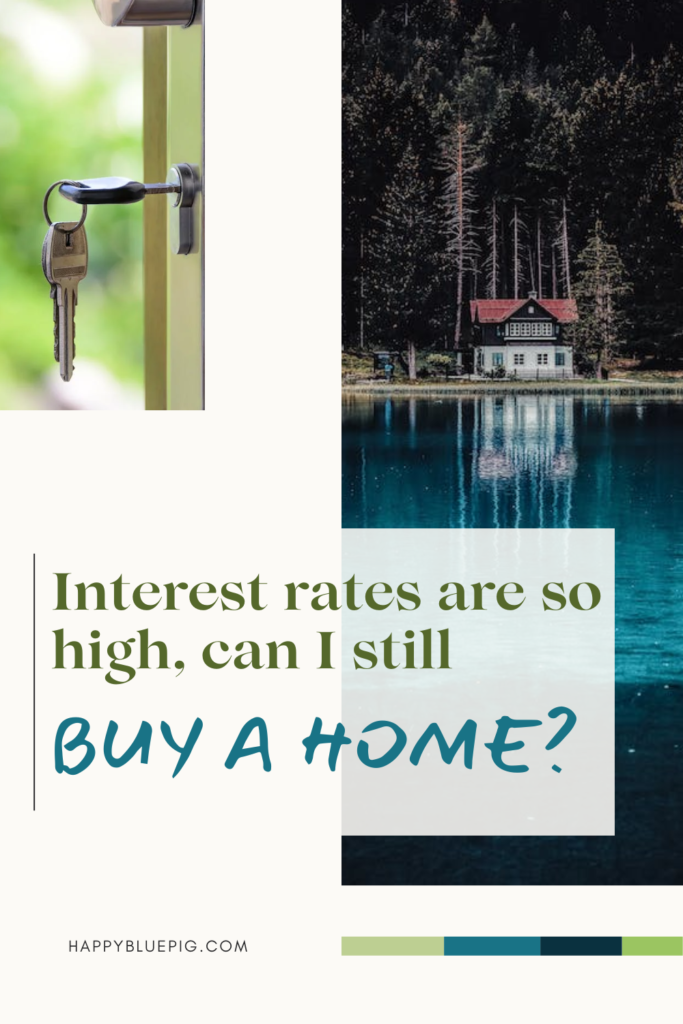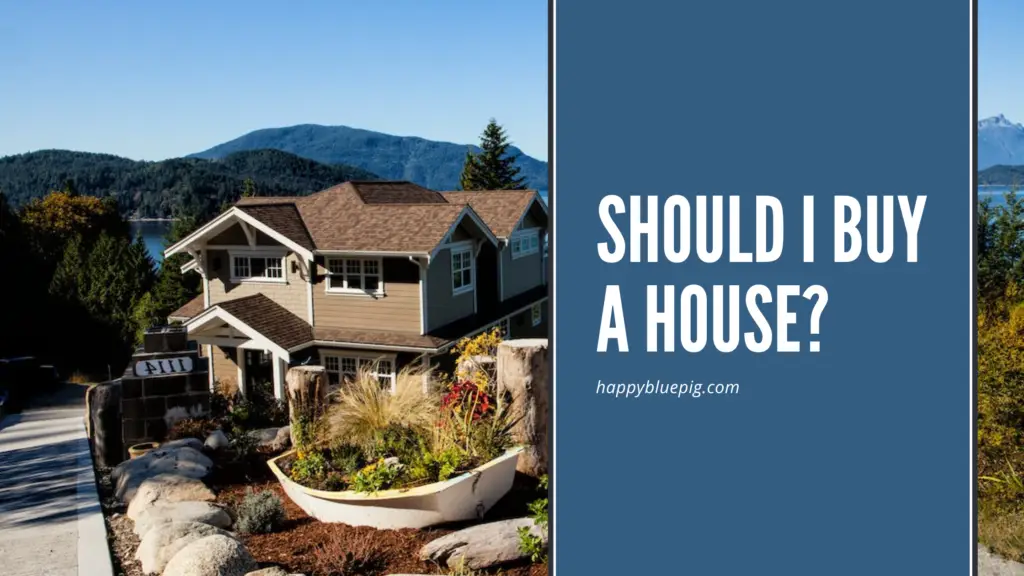If you’ve been thinking about buying a home this year, you know that it’s a tough market for buyers. Interest rates for mortgages are high, and there is still a lot of demand for homes. That means that home prices are still high, making it harder on your budget. So should you buy a house? Let’s take a look at some things you should consider in making your decision.
This post may contain affiliate links, which means I’ll receive a commission if you purchase through my links, at no extra cost to you. Please read full disclosure for more information.
Are you ready to STAY in a home?
Because of all the costs that go along with buying a home, like closing costs, you need to be prepared to stay in that home for several years. Work or a new relationship could cause you to want to live in a different area. Also, if you’re planning to have children in the next few years, check out the school district now. If you decide to move in a year or two, you will have closing costs to pay again and little time for the worth of the home to increase. This will mean less money available for purchasing your next home. I would recommend that you stay in your home at least 5 years. If you are in your home 5 years, you will have more increase in equity in your home to counterbalance any closing costs, repairs to the home, or a downturn in the housing market.

Do you know what you want and need in a home?
Unfortunately, you probably won’t get everything you want. But you do need to make sure you meet all your needs. If you are buying a home with a spouse, sit down together and make a list. Determine which things you absolutely need in a home. This could be a certain number of bedrooms or bathrooms, an office, a yard, or a garage.
Also think about what updates you may be willing to make in a home. Paint colors, flooring, or landscaping are easily updated if the home’s appearance is dated. A home that requires big repairs like a new roof will take more consideration. Location is one factor that cannot be changed, so make sure that you are happy with the location.
Finally, consider if you are or are not willing to consider a Homeowners Association (HOA). You may get some perks in a community with an HOA. However, you will also need to pay HOA fees and follow HOA rules. It is important to recognize that just because HOA fees are low now, they can increase in the future. An HOA that is relaxed could become more strict in the future with change in leadership.
Are you financially ready?
Emergency fund
If you don’t already have an emergency fund, you need one before you purchase a home. If you were to have an unexpected large home repair or a loss of income, you need some money saved to fall back on. You should have enough money saved in your emergency fund to cover 3-6 months expenses. This protects you and your credit score, and it keeps you from losing that new home. If you need an emergency fund and don’t know where to start, check out this article.
Down payment
You should ideally have a 20% down payment. At a minimum, you need a 10% down payment. The first reason is that if you don’t have a sufficient down payment, you will need to pay private mortgage insurance (PMI). This is an extra cost that you won’t have with a 20% down payment.
The other, and possibly bigger, concern is that you could end up upside down on your home. This is also called a negative equity mortgage or an underwater mortgage. Basically, you owe more than the home is worth. It’s not as common with real estate since home values generally increase over time. However, if you suddenly need to sell and the market is down, you may still owe money even after the sale of the home. And if you’ve been house shopping, you know there’s a lot of demand pushing home prices up. Many people in bidding wars are paying more than their home’s appraised value. That can be dangerous if you do find yourself needing to sell in less than 5 years. If home prices drop, you may not be able to sell your home for as much as you spent to purchase it. If you have a 20% down payment, you will be in a much better position and should not be upside down on your home.
Credit score
Do you know what your credit score is? Now is the time to find out. You may also want to get a copy of your credit report to make sure it looks accurate. The three major credit bureaus are Transunion, Experian, and Equifax. You can get your credit report for free and it won’t affect your credit score. If something is on your credit report that is incorrect, begin the process for removing it.
Per Equifax, most conventional mortgages require a credit score of 620 or more. Ideally your credit score should be in the 700s or higher to get the best rates. If you find your credit score is lower than what you want or need, get started making some changes. Check out this article on how to improve your credit score.

How much home can you afford?
There are rough guidelines that you can follow. If you search “What percentage of my income should go to my mortgage?”, you’ll see that the consensus is 28% or less of your gross monthly income. This is just a guideline, and you will have a much better idea by looking at your own budget and goals for your future. If you don’t have a budget, you should make one now before you buy a home. Check out this article to get started, or join my email list for an easy-to-use budget spreadsheet.
How much you will need to spend on housing will depend on where you live. We spend 18% of our gross income, and that includes our mortgage, home owners insurance, taxes, and regularly budgeted home maintenance. Personally, I don’t think we’d want to spend more than that on our home. It would make our budget tight in other areas. In your area, you may not be able to buy or rent any home for 18% of your gross income. So make a budget to see what you can afford before you buy.
You should get preapproved for a mortgage before buying a home, but don’t use the amount of the preapproval as your housing budget. Just because the bank will loan you the money, doesn’t mean that mortgage payment will fit into your life and plans.
Costs of home ownership
When you make your decision to buy, consider all the additional costs of home ownership vs renting. When you rent, you have your monthly rent payment and some or all of your utilities. With home ownership, you are responsible for all utilities, home repair, homeowners insurance, and taxes. If you have a friend or family member who lives in the area, ask if they are willing to share how much they spend on their home repairs, insurance and taxes. The internet has a lot of information, but the best source is someone from the precise area where you want to buy. Then, use that information and a mortgage calculator to get an estimate of what a home will cost you each month.
Future plans
Be careful to not just go off a percentage of current gross income, without also considering what you want for your future. Do you hope to have children? Expect that you will either have additional childcare costs in the future, or reduced income as someone will be staying home with the children. Do you dream of changing careers or starting a business? You may need to start at the bottom and work your way up. That could mean reduced income for a time.
For a career change or starting a business, you can either buy a cheaper home, or you can make sure you save extra before buying to cover the years of lower income. Either way, you need to be prepared so you don’t end up with a home you can’t afford.
When we were looking for a home, we were newly married with 2 full time incomes. However, I knew that if and when we’d have children, I would want to leave my current job. I was a director working long hours, and I knew that with the change to part time work my income would drop. It was hard to limit ourselves, but we wanted to be sure we could afford the home if I would change jobs. I’ve now been working part time for over 2 years and we’ve always been able to make our mortgage payment. A larger or newer home would be nice. I won’t sugar coat it – our house is old and a fixer-upper. It will take a long time to fix everything up, but I’m so grateful we spent less so that I can be home with my son.

What about the high interest rates? Is now the time to buy?
Interest rates are high; home prices are high. That is a challenge, but it doesn’t mean you shouldn’t buy a house if you’re ready. Ultimately, you are buying this house to live in, not as an investment. If you are financially ready to buy a home and the right house comes up, there’s no reason you shouldn’t buy it. Just remember, that the key to success in this kind of market is to have a sufficient down payment and to stay in the home 5 years or more.
Refinancing
Rates will likely drop at some point in the next few years. When that happens, you can refinance your mortgage. There will be fees or points, but the lower interest rate is often worth it. And there are lots of handy refinance calculators to help make that decision. Depending how things are going for you, you may even be able to reduce the term of your loan at that time to save yourself even more on interest.
Adjustable-Rate Mortgage
If there were ever a time that an adjustable-rate mortgage (ARM) would be good, it would be when interest rates are high. However, I do NOT recommend a variable rate mortgage! I think the risks are just not worth it. You might choose an ARM with a fixed rate for the first 5 years, planning to refinance in that time. If that works out, that’s great, but what if it doesn’t? What if you have a change in career or a loss of income and are unable to refinance like you planned? In addition to the loss of income, you now have the increased financial struggle of a higher interest rate. If you can’t afford a higher mortgage payment if you’re unable to refinance, then you should get a fixed rate mortgage instead.


